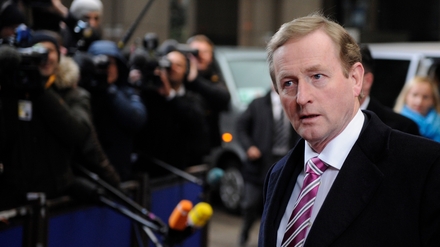European leaders have agreed a permanent rescue fund for the eurozone and 25 out of 27 EU states backed a German-inspired pact for stricter budget discipline, but they struggled to reconcile fiscal austerity with economic growth.
Only Britain and the Czech Republic refused to sign a fiscal compact in March that will impose quasi-automatic sanctions on countries that breach EU budget deficit limits and pledging to enact balanced budget rules in national law.
Officially, the half-day summit focused mainly on a strategy to revive growth and create jobs at a time when governments across Europe are having to cut public spending and raise taxes to tackle mountains of debt.
But differences over the limits of austerity, and Greece's unfinished debt restructuring negotiations, hampered efforts to send a more optimistic message that Europe is getting on top of its debt crisis.
French President Nicolas Sarkozy told a news conference he expected a final agreement on reducing Greece's debt to private bondholders "in the next few days" and believed that European institutions, a clear reference to the European Central Bank, would decide independently to help meet a funding gap.
EU Council President Herman Van Rompuy said a deal was needed this week for it to be finalised in time to avert a Greek default in mid-March when it faces huge bond repayments.
Asked about a German proposal to place Greek public finances under the control of a European commissar, Mr Sarkozy said: "That there should be supervision is quite normal, but there can be no question of any country being put under stewardship."
The leaders agreed that a €500bn European Stability Mechanism will enter into force in July, a year earlier than planned, to back heavily indebted states.
Mr Sarkozy said Czech Prime Minister Petr Necas had said he could not sign up now for constitutional reasons.
British Prime Minister David Cameron told reporters: "We are not signing this treaty. We are not ratifying it. And it places no obligations on the UK.
"Our national interest is that these countries get on and sort out the mess that is the euro."
German Chancellor Angela Merkel said that although Mr Cameron had shown no sign of relenting in his opposition to treaty change, the new pact could be easily slotted into EU law at a later date and she expected it would be within five years.
The 17th summit in two years as the EU battles to resolve its sovereign debt problems was called to shift the narrative away from politically unpopular austerity and towards growth.

Govt has 'no fear' over referendum - Kenny
Earlier, Taoiseach Enda Kenny said the Government would have "no fear, concern or anxiety" about holding a referendum on the EU treaty on tighter budgetary discipline.
Mr Kenny said the Government had "nothing to fear about a referendum at all".
He said the text of the treaty would be sent to the Attorney General, who would decide if the agreement was in compliance with the Irish Constitution.
Mr Kenny said if it was in compliance, there would not be a need for a referendum.
Taoiseach presents jobs & SME support strategy
The Taoiseach made a presentation at the summit on the Government's plans to boost job creation in the small and medium-sized business sector.
He highlighted an Action Plan for Jobs designed to target youth unemployment
Mr Kenny spoke about the Temporary Partial Credit Guarantee Scheme and a Micro Finance Loan Fund, worth €100m over ten years, to supplement normal bank lending.
There would also be a Strategic Investment Fund "for targeted support to enterprise via equity and debt funding".
Mr Kenny referred to monitoring banks guaranteed by the State to ensure that they meet lending targets to the real economy, "making a success" of the Credit Review Office for small and medium businesses who have been refused credit, and the rolling out of the 15-day prompt payments initiative.
The Taoiseach also referred to changes in the bankruptcy laws, the ability for smaller businesses to access research and development funding, and tax credits for companies exporting to new markets.
There was also a reference to reducing bureaucracy by 25% by the end of 2012.
Mr Kenny said he hoped the jobs creation issue would be kept central to the agenda of EU summits from here-on because "this is what European politics is about".
Surprise Sarkozy move
Last night, French President Nicolas Sarkozy said he would unilaterally introduce a financial transaction tax of 0.1% from next August.
In a television interview, Mr Sarkozy said its introduction would cause a shockwave, setting an example to encourage other European countries to do the same.
He said that the tax would enable French companies to keep jobs at home instead of outsourcing them abroad.
Advocates of the tax see it as a potentially significant revenue generator as well as a penalty against speculation, but critics say it could cause investors to pull their money out of countries applying it.
Some governments have in recent years taken up the campaign but most now intend to use the so-called "Robin Hood tax" to help reduce their budget deficits rather than embark on specific social programmes.
Follow: @tconnellyRTE @RTENewsPaulC

